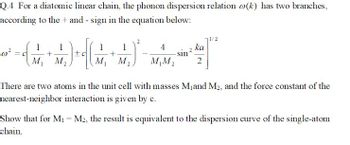Question

Transcribed Image Text:Q.4 For a diatomic linear chain, the phonon dispersion relation o(k) has two branches,
according to the+ and - sign in the equation below:
0²
1 1
(+)
M₁ M₂
=C
1
+
M₁ M₂.
2
1/2
ka
쌀²
4
M₁M₂ 2
sin ²
There are two atoms in the unit cell with masses M₁ and M₂, and the force constant of the
nearest-neighbor interaction is given by c.
Show that for M₁ = M2, the result is equivalent to the dispersion curve of the single-atom
chain.
SAVE
AI-Generated Solution
info
AI-generated content may present inaccurate or offensive content that does not represent bartleby’s views.
Unlock instant AI solutions
Tap the button
to generate a solution
to generate a solution
Click the button to generate
a solution
a solution
Knowledge Booster
Similar questions
- Calculate Z for a single oscillator in an Einstein solid at a temperature T=4TE=4ϵ/kBT=4 TE=4 ϵ/kB . The value of Z isarrow_forwardHow to solve this questionarrow_forwardSuppose that ak > 0 for all k e N and E ak < 0. For each of the following, prove that the given series converges. ak ( a ) ΣΕΙ 1+ k3ak (b) Lk=1 1+ ak Vak (c) Ek=1 k < 0o.arrow_forward
- Consider the function v(1,2) =( [1s(1) 3s(2) + 3s(1) 1s(2)] [x(1) B(2) + B(1) a(2)] Which of the following statements is incorrect concerning p(1,2) ? a. W(1,2) is normalized. Ob. The function W(1,2) is symmetric with respect to the exchange of the space and the spin coordinates of the two electrons. OC. y(1,2) is an eigenfunction of the reference (or zero-order) Hamiltonian (in which the electron-electron repulsion term is ignored) of Li with eigenvalue = -5 hartree. d. The function y(1,2) is an acceptable wave function to describe the properties of one of the excited states of Lit. Oe. The function 4(1,2) is an eigenfunction of the operator S,(1,2) = S;(1) + S,(2) with eigenvalue zero.arrow_forwardShow that the minimum cnergy of a simple harmonic oscillator is Fw/2 if ArAp = h/2, where (Ap)² = ((p - (p))?). %3Darrow_forwardplease answer c) only 2. a) A spinless particle, mass m, is confined to a two-dimensional box of length L. The stationary Schrödinger equation is - +a) v(x, y) = Ev(x, y), for 0 < r, y < L. The bound- ary conditions on ý are that it vanishes at the edges of the box. Verify that solutions are given by 2 v(1, y) sin L where n., ny = 1,2..., and find the corresponding energy. Let L and m be such that h'n?/(2mL²) = 1 eV. How many states of the system have energies between 9 eV and 24 eV? b) We now consider a macroscopic box (L of order cm) so that h'n?/(2mL?) ~ 10-20 eV. If we define the wave vector k as ("", ""), show that the density of states g(k), defined such that the number of states with |k| between k and k +dk is given by g(k)dk, is Ak 9(k) = 27 c) Use the expression for g(k) to show that at room temperature the partition function for the translational energy of a particle in a macroscopic 2-dimensional box is Z1 = Aoq, where 2/3 oq = ng = mk„T/2nh?. Hence show that the average…arrow_forward
- A real wave function is defined on the half-axis: [0≤x≤00) as y(x) = A(x/xo)e-x/xo where xo is a given constant with the dimension of length. a) Plot this function in the dimensionless variables and find the constant A. b) Present the normalized wave function in the dimensional variables. Hint: introduce the dimensionless variables = x/xo and Y(5) = Y(5)/A.arrow_forwardc) How does the classical kinetic energy of the free electron compare in magnitude with the result you obtained in the previous part?arrow_forwardProblem 3. Consider the two example systems from quantum mechanics. First, for a particle in a box of length 1 we have the equation h² d²v 2m dx² EV, with boundary conditions (0) = 0 and (1) = 0. Second, the Quantum Harmonic Oscillator (QHO) V = EV h² d² 2m da² +ka²) 1 +kx² 2 (a) Write down the states for both systems. What are their similarities and differences? (b) Write down the energy eigenvalues for both systems. What are their similarities and differences? (c) Plot the first three states of the QHO along with the potential for the system. (d) Explain why you can observe a particle outside of the "classically allowed region". Hint: you can use any state and compute an integral to determine a probability of a particle being in a given region.arrow_forward
arrow_back_ios
arrow_forward_ios